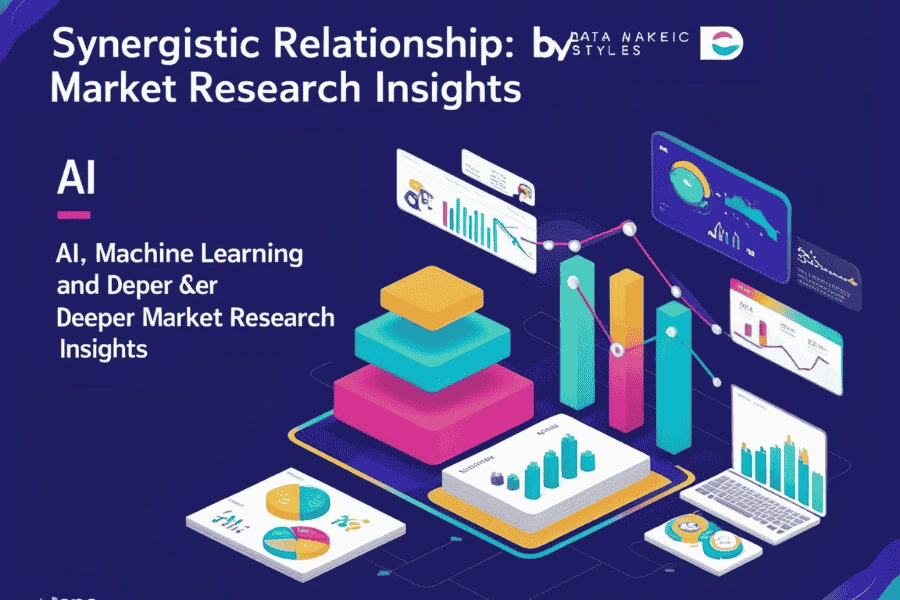Leveraging AI and Machine Learning for Deeper Market Research Insights
Introduction: A New Era in Market Research
Traditional market research relies heavily on surveys, interviews, and manual data analysis. While these methods still provide value, they can be slow, expensive, and limited in scope. Today, AI (Artificial Intelligence) and Machine Learning (ML) are transforming the field of market research by enabling faster, smarter, and more accurate insights. With AI and ML, businesses can now analyze huge amounts of data from multiple sources, identify hidden patterns, predict customer behavior, and make better decisions—all in real time.

Understanding AI and Machine Learning
AI is the ability of machines to perform tasks that usually require human intelligence—like recognizing speech, understanding language, or making decisions.
Predictive Analytics
Machine learning models can predict the characteristics of the target population based on historical data. For example, by analyzing past survey responses and demographic data, a predictive model can identify the most relevant participants for a new survey, ensuring that the sample is representative of the entire population.
Stratified Sampling
Algorithms can assist in stratified sampling, where the population is divided into subgroups (strata) that share similar characteristics. Machine learning ensures that each stratum is adequately represented in the sample. For instance, in a survey about consumer electronics, machine learning can ensure balanced representation from different age groups, income levels, and geographic locations.
Dynamic Sampling
Machine learning enables dynamic sampling, where the sample selection process is continuously adjusted based on incoming data. If initial responses indicate a skew towards a particular demographic, the algorithm can adjust the selection criteria in real-time to ensure a more balanced sample.
2. Improved Survey Design
Designing effective surveys involves creating questions that are clear, unbiased, and capable of eliciting useful responses. Machine learning contributes to this process in several ways:
Question Optimization
Natural Language Processing (NLP) algorithms can analyze historical survey data to identify which questions provided the most insightful answers. By understanding the nuances of language and context, NLP can suggest ways to rephrase questions for clarity and effectiveness. For example, if certain questions consistently lead to ambiguous responses, NLP can help rewrite them to be more specific.
Adaptive Questionnaire
Machine learning can facilitate the creation of adaptive questionnaires, where subsequent questions are tailored based on previous answers. This approach not only keeps respondents engaged but also ensures that the survey collects the most relevant data. For example, if a respondent indicates they recently purchased a smartphone, the survey can dynamically present questions related to their purchase experience and satisfaction.
Bias Detection
Machine learning algorithms can analyze survey questions to detect potential biases. By examining how different demographic groups respond to specific questions, these algorithms can identify and suggest revisions to questions that might lead to biased responses.
3. Enhanced Data Analysis
Once the survey data is collected, machine learning algorithms can further enhance the analysis process:
Pattern Recognition
Machine learning excels at recognizing patterns in large datasets. It can identify trends and correlations that might not be immediately apparent through manual analysis. For example, clustering algorithms can group respondents based on similar response patterns, revealing insights about distinct customer segments.
Sentiment Analysis
For open-ended survey questions, NLP-based sentiment analysis can categorize responses into positive, negative, or neutral sentiments. This provides a deeper understanding of respondent opinions and attitudes without the need for labor-intensive manual coding.
Conclusion: The Future of Smarter Research
AI and machine learning are no longer just buzzwords—they are powerful tools reshaping the way businesses do market research. By using AI to dig deeper into data, companies can uncover insights that would otherwise go unnoticed. This leads to smarter strategies, better products, and a stronger connection with customers.
As technology continues to grow, businesses that embrace AI-driven research will have a clear advantage in understanding and leading their markets.
Active Events
Navigating the World of SERP Features: Tips, Tricks, and Strategies
Date: Aug 07, 2025 | 7:00 PM(IST)
7:00 PM(IST) - 8:10 PM(IST)
2811 people have registered
Your Data Science Career Game-Changing in 2024: Explore Trends and Opportunities
Date: Aug 08, 2025 | 7:00 PM (IST)
7:00 PM (IST) - 8:10 PM (IST)
2811 people have registered
Bootcamps
Digital Marketing Bootcamp
- Duration:4 Months
- Start Date:Aug 09, 2025
Data Science Bootcamp
- Duration:4 Months
- Start Date:Aug 09, 2025
